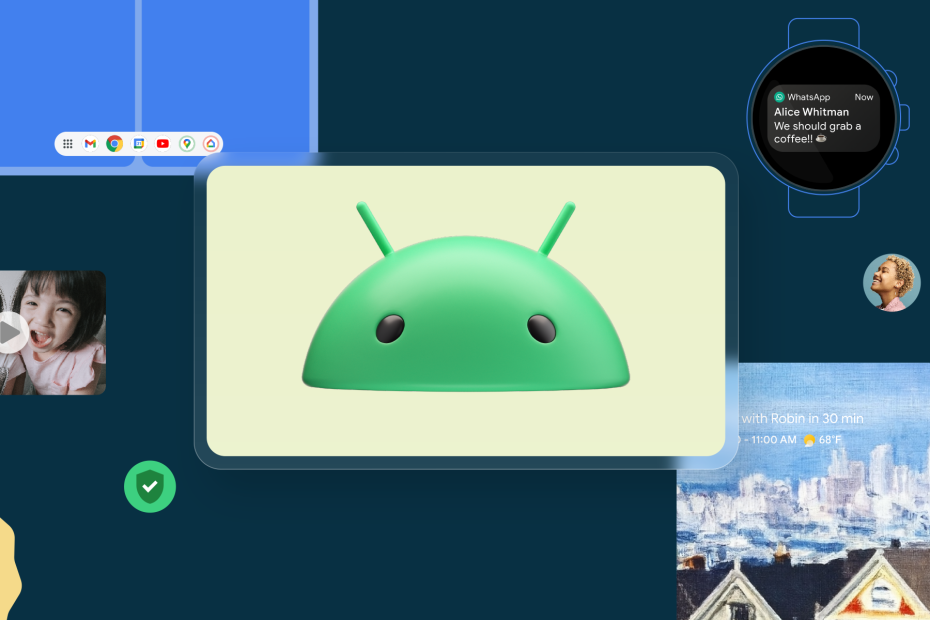Read the latest news and tips about Google's Android operating system and devices from brands such as Samsung, Motorola and LG that use Android.
Adverts
The dynamic universe of mobile operating systems has seen a remarkable evolution in the latest versions of Android, developed by the technology giant, Google.
In this review, we will explore the technical and practical aspects of the latest Android updates, as well as their integration into market-leading devices, such as Samsung, Motorola and LG.
Design and Performance:
The latest versions of Android impress from the first glance. An elegant and subtle interface is the hallmark, offering a visually captivating user experience. The system fluidity is considerably fast, reflecting a notable optimization in resource management. However, a notable gap emerges during the configuration process.
Configuration Challenges:
Android Device Manager, a crucial security tool, is not introduced during initial setup. This places an additional burden on the user, who is required to perform extra configuration after system startup.
This is a point that, although it does not significantly harm usability, could be simplified to improve the user experience.
Hardware Requirements:
A considerable highlight is the reduction of the minimum RAM requirements to 512 MB. This strategic decision is a crucial step in the democratization of Android, allowing low-cost devices to take advantage of the operating system's robustness.
Devices previously limited by hardware restrictions now have the opportunity to deliver a smoother Android experience.
Democratization of Android:
Accessibility to quality mobile devices has been a barrier for many consumers, especially in emerging markets. With the minimum requirement of 512 MB of RAM, Android is now able to gain an even wider user base.
This not only drives the system's popularity, but also strategically aligns with Google's mission to bring connectivity to every corner of the world.
Future perspectives:
Despite the obvious improvements, Android is not immune to challenges. Fierce competition in the mobile operating system market requires constant innovation to maintain relevance.
While user experience and feature optimization are strengths, it is crucial that Google maintains a balance between innovation and stability to ensure continued user trust.
Integration with Featured Devices:
The Android experience is amplified when implemented on market-leading devices such as Samsung, Motorola and LG. The perfect integration between hardware and software from these brands provides a synergy that further enhances the effectiveness of Android.
The advanced features of these devices, combined with the flexibility of the operating system, create an exceptional user experience.
Samsung: Advances in One UI Interface:
The ongoing collaboration between Android and Samsung has resulted in notable user interface improvements.
One UI, superimposed on Android, presents an intuitive approach, facilitating navigation and customization for the end user. The fluid experience and seamless integration of additional features highlight the strength of this partnership.
Motorola: Betting on the Pure Android Experience:
Motorola opts for a minimalist approach, offering a near-pure Android experience on many of its devices. This not only speeds up system updates, but also provides a user experience closer to Google's original vision.
The focus on simplicity is a differentiator, attracting users looking for an Android experience without excess.
LG: Innovation and Personalization:
LG, in turn, stands out for its innovation and customization. The integration of specific features, such as camera enhancements and exclusive functionality, adds a layer of personalization that appeals to an audience looking for more than a conventional Android experience.
This bold approach positions LG as a force to be reckoned with in the Android device market.
Future Perspectives and Anticipated Innovations:
As Android continues its evolutionary journey, future prospects suggest a continued focus on innovation and overcoming pre-existing challenges.
Google, as the maestro behind Android, faces the responsibility of balancing the introduction of new features with system stability.
The advent of emerging technologies such as quantum computing and 5G connectivity present opportunities to improve Android's efficiency and speed.
Integrating these technologies could result in significant advances, not only in performance, but also in creating unprecedented user experiences.
Collaboration with application developers will be crucial in this scenario. As Android advances, creating applications optimized to take full advantage of the operating system's capabilities is essential.
Creating a cohesive ecosystem, where both Android and apps evolve synchronously, will be key to ensuring a truly integrated user experience.
Security Challenges and Opportunities:
Security remains a non-negotiable priority in the digital world, and Android is no exception. Google faces the challenge of continually improving operating system security, ensuring protection against constantly evolving cyber threats.
Proactive strategies such as regular security updates and malware detection improvements will be vital to maintaining user trust.
The integration of Android with smart devices and the expansion of the Internet of Things (IoT) concept also present unique challenges and opportunities.
Interoperability between devices and the security of data shared between them will require a careful approach and constant innovations to ensure users are protected in an increasingly connected environment.
Conclusion:
Android, in its most recent versions, represents a positive evolution in the scenario of mobile operating systems.
With a sleek interface, improved performance, and reduced hardware requirements, Google is paving the way for greater adoption, especially on lower-end devices.
Effective collaboration with prominent brands such as Samsung, Motorola and LG highlights Android's versatility in adapting to different user approaches and styles.
However, challenges persist, and maintaining uniformity and security, especially amid fragmentation, is imperative to Android's continued success.
Ultimately, Android remains at the forefront of mobile innovation, delivering an enhanced user experience and expanding its reach to different market segments.
With a solid foundation and a clear vision for the future, Android continues to shape the way we interact with our mobile devices, establishing itself as a lasting force in the contemporary technology landscape.


